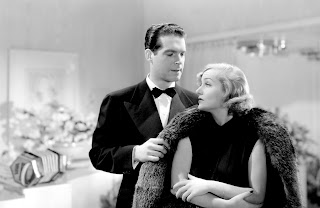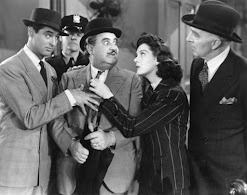 Watchingwell
Watchingwell
Curated classic films
Lombard’s dizziness plays off the sensible butler-in-disguise, William Powell, in My Man Godfrey (1936), directed by Gregory LaCava, for which she received an Academy Award nomination and Ernst Lubistch’s To Be or Not to Be (1942) with Jack Benny (remade in 1983 with Mel Brooks and Anne Bancroft), as members of a Polish theater group outsmarting Nazi occupiers, are both classics and not to be missed, but the lesser-known, Mr. and Mrs. Smith (1941), is a gem with Robert Montgomery who had a real talent for comedy, directed by Alfred Hitchcock (his only real comedy).
Speaking of distinctive voices, but one that is on the other end of the scale, Rosalind Russell had a low, authoritative voice that she modulated skillfully to portray sophisticated, unflappable women. In His Girl Friday (1940), the Howard Hawks direction makes it all about the dialogue: the breakneck speed, the breathless overlapping, the sarcastic tone -- all perfect for Russell's skill. Paired with Cary Grant, who is no slouch at comedy, and with Hecht and MacArthur's script (from their play, The Front Page, which was first made into a film in 1931 with Adolphe Menjou and Pat O'Brien), and a terrific supporting cast, this cynical look at the world of the big city newspaper biz is over-the-top funny. This is a film that I have seen dozens of times and am still discovering bits of dialogue or nuances of performance each time. One of my five fave films of all time.
well. Mitchell Leisen directs Take a Letter, Darling with Fred MacMurray as a struggling artist who takes a job as Russell's secretary/companion, because in 1942, as the head of an advertising agency, she needed a man sometimes to fend off admirers or disarm the wives of clients. The business arrangement becomes complicated as MacMurray grows resentful and Russell becomes jealous when the pair try to land an important account.
The blonde bombshell, Jean Harlow, another actress whose life was tragically short – she died at 26, was actually more effective (imo) in comedy than in dramatic roles. She had a knack for playing with her image, as in – Bombshell from 1933 in a story that could be seen as a self-parody of her own private life, with Lee Tracy as a studio press agent who won’t allow her to stray from her sexy image, thwarting her attempts to adopt a baby and take on serious roles. Directed by Victor Fleming, this is pre-code comedy at its best with Franchot Tone and an impressive supporting cast.
In Tea for Two (1950) she perfects the wisecracking character, tossing off one-liners in that droll voice, as Doris Day’s best friend, that she displayed in The Kid from Brooklyn 1946, the early Danny Kaye film.
Lucille Ball, who most people associate with the most iconic TV comedy, had an unusual film career – and not always funny. She had a few good lines in star-studded Stage Door (1937) but I think one of her best roles was not in a comedy. In Without Love (1945), the stars are
Hepburn and Tracy, but in a supporting role, she has some good lines and delivers them in a sophisticated tone. Watching, one feels that it was too bad that she was not given more of this kind of role.
Ball is probably at her comic best in Easy to Wed from 1946, a remake of Libeled Lady, -- a good comic performance by Ball even though the film is nowhere near as good as the original.
Need to mention one other film star who made us laugh and at the same time took herself seriously enough so that at one time she was the highest paid woman in the U.S. (1936), and basically saved Paramount studios from going under. I’m speaking, of course, of Mae West. She adapted the plays she wrote to film, so most of her lines were her own. Her innuendos eventually brought on the censors and she used tone and expression with more discreet lines that slipped by the censors but somehow sounded risqué. Her mission was to ridicule puritanical society and although she only made 12 films, she made an impact, her one-liners still quoted often because she was very much ahead of her time. Probably, her best work in film, She Done Him Wrong , directed by Lowell Sherman, and I’m No Angel (When I’m good, I’m very good, but when I’m bad, I’m better), directed by Wesley Ruggles, both written by West from 1933.
Ya know it was a toss-up whether I go in for diamonds or sing in the choir. The choir lost.
Goodness had nothing to do with it. (Goodness, what beautiful diamonds!)
His mother should have thrown him away and kept the stork.
A woman in love can't be reasonable -- or she probably wouldn't be in love.
To err is human - but it feels divine.
JUDGE: Are you trying to show contempt for this court? MAE WEST: I was doin' my best to hide it.
She's the kind of girl who climbed the ladder of success wrong by wrong.
I generally avoid temptation unless I can't resist it.
Between two evils, I always pick the one I never tried before.
Those who are easily shocked should be shocked more often.
Too much of a good thing can be wonderful.
I used to be Snow White, but I drifted.





















